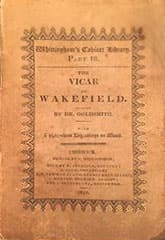The Vicar of Wakefield
Critique • Quotes
 1819 edition
1819 editionFirst publication
1766
Literary form
Novel
Genres
Literary
Writing language
English
Author's country
England
Length
Approx. 66,000 words
Lovable, or just too stupid?
The Vicar of Wakefield is supposed to be a satire, an ever gentle one in which the wide-eyed trust and peiety of the good pastor leave him at the mercy of larcenous rascals, until they have stripped him clean of everything he holds dear, not just his modest wealth but his home and family and even his freedom.
The vicar isn't ridiculed for his dogmas as much as he is indulged in them by the reader who likes him regardless. And in the end it all comes out well. The villains are uncovered, and the vicar is restored to financial health and familial happiness.
The naming of the central character as Mr. Primrose gives away how broad is the satirical intent. Readers are in on the joke from the beginning as we see through the tricks being played upon the Primrose clan long before they are aware of anything out of the ordinary.
Along the way, Goldsmith slips in further satires upon the literary and cultural fashions of the time, as well as upon the British class system in general, safely assuming the reader get the points even if the characters illustrating them do not.
The Primrose path of victimhood
So I understand the ironies at work in The Vicar of Wakefield. Problem is that they are so obvious as to defy belief. No one could be as unrelentingly stupid, and hence unrelentingly victimized, as are the Primroses.
It becomes a drag to have to read through each episode when the upshot is so clear, at least until the novel's giddy climax.
That's when incredible coincidences bring everyone together in the same room, a prison cell, for all the the misunderstandings to be cleared up. At this point the novel takes on that hyper air of a theatrical farce in the conclusion of which, one after another, secret identities are revealed, skullduggery is brought to light, the good are rewarded, the evil are instantly converted to righteousness, and all available single men and women are paired off to live happily ever after.
It's not bad. Broad farce can be enjoyable.
But the overly neat conclusion does seem to undercut any serious intent of the satire. It's as though Goldsmith is attacking one set of hypocritical standards to replace them with a completely new set.
Now I know a couple centuries of readers have embraced Mr. Primrose and his family. They've even come to love them. I gather this has occurred less in recent years. Yet The Vicar of Wakefield is still considered a sentimental public favourite. People like to identify with a well-meaning victim, as any number of movies about innocent folks caught up in evil machinations might attest to.
But the vicar is just too annoyingly stupid for my sympathy.
A reading some years ago left me wondering about further depths in the novel that I hadn't reached at first crack—a lingering feeling that is generally a good sign for a novel's long-term value. A recent second reading however revealed nothing else.
I'm obviously in a minority here though, so don't let this stop you from reading this book. You may be among the millions who seem to see something that I don't in the simple, idiotic vicar of Wakefield.
— Eric
Critique • Quotes

